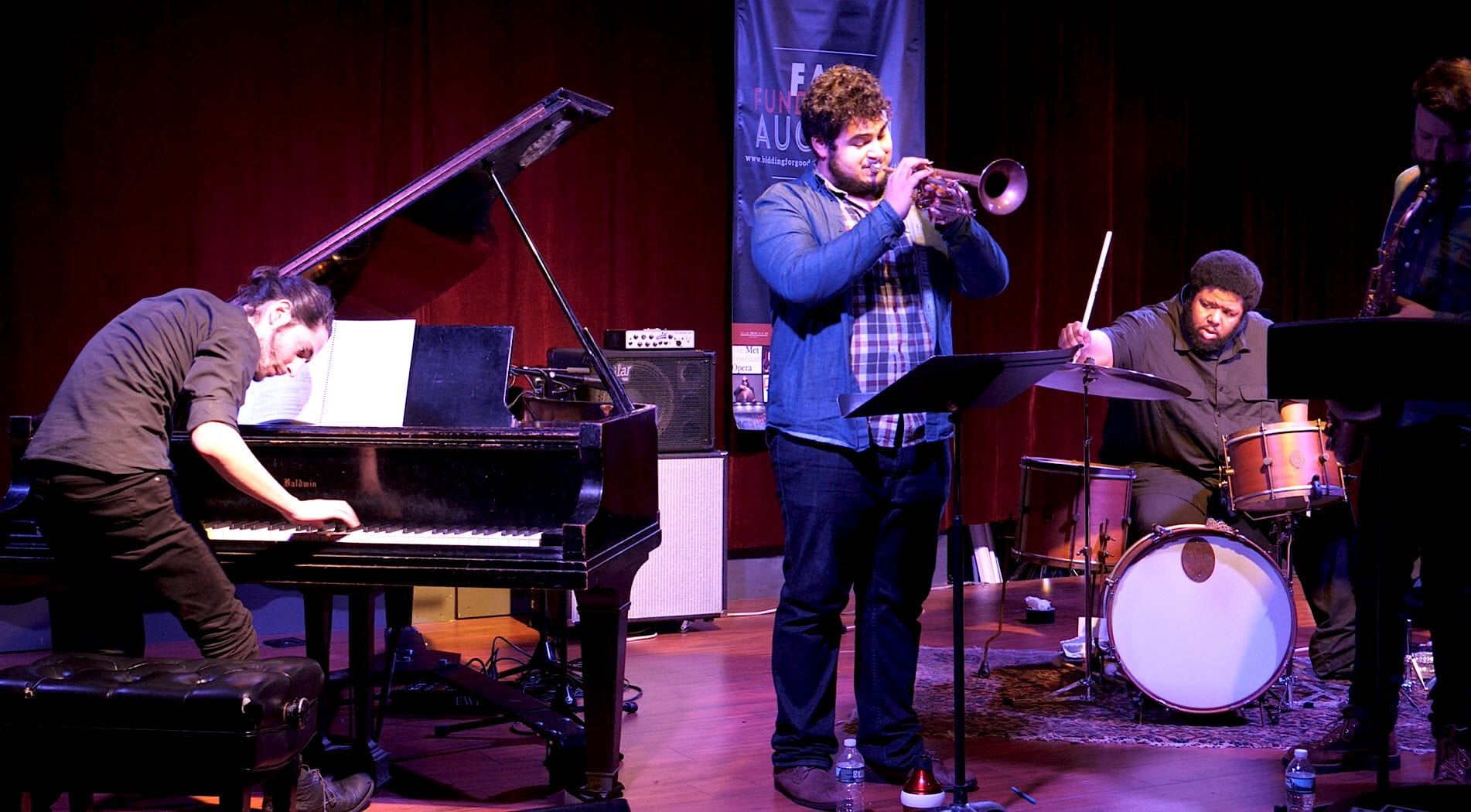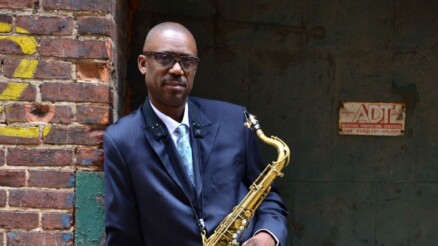When Has Something Ever Ended? Gabriel Zucker Writes Music Against Resolution

Gabriel Zucker does not like resolution. One of his big aims as a composer is to subvert the tidily packaged cadences and compositional finales that have become a hallmark of the Western music tradition. To his ears, those kinds of devices feel divorced from our lived reality — where virtually nothing has such neat closure.
Zucker grew up studying Western classical music; he started taking piano lessons at 8, working his way through pieces by composers like Franz Liszt and, later, Charles Ives. Attending college at Yale, Zucker saw the energy and spontaneity of his classmates studying jazz, and he set his sights on entering that world. “I discovered over time that the sounds I heard, and work I wanted to do, was being more … eloquently executed by people in the jazz world,” Zucker said. “There was something about the intensity of playing moment-to-moment.”
Still, like various other musicians on the amorphous creative music scene in New York City, Zucker identifies with the Western art-music tradition even more than the jazz world. Yet he sources his inspiration widely. Across multiple projects, such as his 12-piece indie jazz orchestra, the Delegation; the sonically dense folk band underorder; and his acoustic quartet, Weighting, you can hear the crashing energy of rock, the reeling and wrenching power of Wadada Leo Smith’s free improvising, and the large-scale harmonic vision of Wayne Shorter.
Those strands all thread together on Weighting, his quartet’s eponymous debut album out this month. The record’s eight tracks become one larger work, inspired by Rachel Kushner’s novel The Flamethrowers, set in the art world of 1970s Manhattan and Europe. For the recording, and the touring performances of it, Zucker recruited some iconic voices of New York’s creative music cauldron, like the idiosyncratic master drummer Tyshawn Sorey and the textual trumpeter Adam O’Farrill (son of Afro-Cuban icon Arturo O’Farrill). Together, the group fleshes out the scenes Zucker wrote exploring questions of what emotional “weights” — that is, things of particular importance and heft — we carry with us in life.
Zucker brings the Weighting project to the DMV area for two performances this week: one at Twins Jazz on Nov. 28 and another at An Die Musik in Baltimore on Nov. 29. O’Farrill and saxophonist Eric Trudel, who recorded the album, will be on hand; so will fellow sonic explorer Kate Gentile, taking Sorey’s place behind the kit. I talked to Zucker recently about drawing musical inspiration from literature, his view of the “organic” nature of New York music scenes and the emotional “weights” carries with him.
CapitalBop: So, your new album, Weighting, is inspired by the novel The Flamethrowers. What was it about this text, and this author, that sparked your musical imagination?
Gabriel Zucker: I was just recently trying to wrestle with how to phrase that. I was writing a note to Rachel Kushner, the author, and trying to explain to her how I felt about what I was trying to do with the text. The way I ended up phrasing it was that, earlier on, I think when we first played this a couple years ago … I sold it as “based on” the novel. Which, in retrospect, was not accurate because it’s not the case that I wrote some program music illustrating the plot or that characters are represented by themes or anything like that. It’s much more that at that time I was … writing while reading this novel. There were so many things in the novel that resonated with what I was trying to write. It became that as I had musical ideas that were floating around, I kept tying them in my mind to ideas I had read in the book or situations the characters were in or philosophies it expounded. I decided to try and run with it: Instead of trying to come up with my own textual gloss on those ideas, I figured, just use the words that were actually inspiring to me, that were sticking in my mind as I was writing.
CB: So what resonance did you hear between what you were writing and what Rachel Kushner wrote?
GZ: I don’t know if you’ve seen what’s on the Bandcamp — there’s one main quote that I sent out with the press materials but there’s an epigraph after each movement and I think those get across the ideas that resonated with me directly…. There is one overarching thing, which is where I think the name of the piece, Weighting, comes from: a long passage, towards the end of the book, that talks about this idea of weighting your soul down so it doesn’t fly away … and needing to do that to give your life meaning…. That’s certainly the overarching concept, the question of: “What are the things that keep you here in your life that have that weight and that meaning?” But it’s a long piece, there’s not just one idea that controls all of it. There’s different stuff going on and different parts of the novel that I stole for different elements….
‘Most of my music … adds a bit of a question mark, or frosted-window aspect, at the end…. I don’t want to make it too neat and tied up with a bow and “move on with your life.”‘
CB: Switching to talk about your scene in New York now, the musicians you perform Weighting with are some of the leading voices in what we might call the “creative music” scene in New York. Did you write Weighting with the voices of Tyshawn, Adam and Luke in mind? Did they come into the project later? What did you think their voices would add to these compositions?
GZ: The former, definitely. I had the band in mind when I was writing. These are really versatile people and I’ve worked with them in a few different contexts; you can kind of throw anything in front of them and they’ll do really beautiful, incredible stuff with it. It’s not like I had to too-carefully tailor it to them. With Tyshawn, there were things that I wrote knowing that most drummers I gave that to would probably struggle with, but he would still play it rather effortlessly. Adam, who I’ve worked with a lot now on different projects — there’s a certain kind of improvisational work that he does in certain harmonic and textual contexts. I always want to make sure I can find spots for those specific things that he does. Same thing with Eric. There were things that I wanted these three people to do but I also wanted to leave them room to improvise in the spaces I really know they’re good at.
CB: Since the novel was not the sole catalyst for writing this piece, what were you thinking about when you first started composing the music that would become Weighting? Was there anything you were trying to experiment with or express? Personally, I hear a lot of Wadada Leo Smith and Lennie Tristano.
GZ: I’m trying to get back in that headspace, considering it was four years ago. Certainly, Wadada is a major point of reference for me, especially in trumpet writing. What I really remember was stuff going on in my life. I was going through a breakup at the time, I had just finished making my first major record around that time and was trying to search for something to hold on to, and trying to create something equally expansive and intense.
CB: That was your record with the Delegation, right?
GZ: Yeah, I finished the first draft of the piece [Evergreen (Canceled World)] in May 2014 and revised it over the summer, then we recorded it in December…. I moved back to New York for real in 2013, and I was just going to so many shows when I got to New York. I think what I was working with musically was what I would hear at a given night at The Stone or the Kitchen or the Jazz Gallery or wherever it was. Now that I’ve sat down with the music again to do these concerts I’ve noticed to some degree that … I was going to a lot of concerts and trying to emulate what I heard people doing. As a random example: In the end of the second movement [“The Uselessness of Truth / Not To Be Anything More”] there’s this kind of quiet, dense build. I remember thinking, very specifically, of a performance I saw Tyshawn and Wadada do about a year earlier and the way they could create motion that wasn’t the usual bombastic build that you might see happen a lot in music…. At the end of the day I sit down to write and I write what is honest to me, even if there’s certain affects or certain compositional, textural moods that I’m borrowing from someone else.
CB: I wanted to ask about another moment in another movement, because it stood out so strongly. The end of movement five, “What’s left (when we are always honest) / The Future Was A Place” there’s this quiet, noir-ish cinematic ending that feels almost out of place with the density of the rest of this work. Where did that come from?
GZ: I had written that movement, pretty much exactly as written, as a standalone piece a few months earlier to play with a different band I had at the time called “Asymptote”…. As I was writing it, it’s not meant to be triumphal. It does not end with that big, triumphal bombast, it ends with a sort of hesitance — which I think is true actually of a lot of music on here. I don’t really love big, defined, resolved endings of the Mahler ilk, or Beethoven or any German Romantic music. It seems to me that if things were that neatly resolved, that doesn’t really map to any life experience I’ve had. Most of my music, even if there is some kind of major arrival that’s clear and to the point, adds a bit of a question mark, or frosted-window aspect, at the end…. This is — going back hundreds, if not more, years — a major point in Western classical music: Pieces are often framed as some conflict you find a way to resolve. I’m not not doing that. There is certainly is an aspect to which I am trying to reach some kind of answers with some kind of conflict or question, but I don’t want to make it too neat and tied up with a bow and “move on with your life.”
I think the clearer part that does that is how the whole piece ends. A few minutes from the ending, there’s a very clear ending resolution with the long cymbal roll, and the theme that’s been trying to break through for 40 minutes finally gets played in its entirety. That would be a very obvious way to end the piece, but then I tack on this other thing that you haven’t heard before and there’s no real reference for it. It doesn’t really go anywhere, it plays for a few minutes and then the piece ends. That feels a lot more evocative than if I were to tie it up with the big, dominant chord and the cymbal-roll whiteout.
Adam O'Farrill, An Die Musik, composer, DC, DC jazz, Gabriel Zucker, jazz, jazz piano, pianist, Rachel Kushner, Twins Jazz, Tyshawn Sorey, Washington




